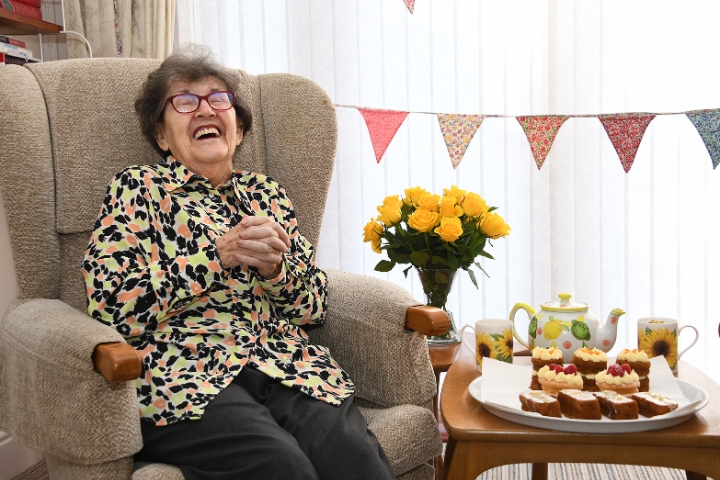Dementia is a progressive condition that affects many people as they age, leading to changes in memory, thinking, and behaviour that impact daily life. At Radfield Home Care, we understand how challenging the early stages of dementia can be for both individuals and their families. With over 40 years of experience in specialist care, we help individuals continue living at home while staying connected to what matters most. In this guide, we explore the early signs of dementia, how they affect daily life, and how Radfield Home Care’s tailored support can make a positive difference.
What are the Early Signs of Dementia?
A 2024 report, commissioned by the Alzheimer’s Society projects that the number of people living with Alzheimer’s in the UK will increase from 982,000 to 1,400,000 by 2040. As the disease becomes more prevalent, recognising the signs of early dementia is crucial in helping individuals and families access the support they need. While dementia presents differently in each person, here are some common indicators that may suggest it’s time to seek guidance and support:
- Memory Loss: Forgetting recent events, important dates, or having difficulty remembering new information is often one of the first signs of dementia.
- Confusion with Time and Place: A person may forget where they are or how they got there, or lose track of time and dates.
- Difficulty Completing Familiar Tasks: Tasks that once felt routine, such as preparing a meal or managing finances, may become increasingly difficult.
- Challenges with Communication: Individuals may struggle to find the right words, repeat themselves, or lose track of conversations.
- Personality or Mood Changes: Someone with dementia might become unusually anxious, depressed, withdrawn, or experience sudden mood swings.
- Poor Judgment and Decision Making: A noticeable decline in decision-making abilities can be seen, such as poor financial choices or neglecting personal hygiene.
If you notice these changes in a loved one, seeking medical advice early can make a significant difference in managing the condition.

Practical Ways to Support Someone with Dementia in the Early Stages
Supporting someone through the early stages of dementia requires patience, understanding, and practical strategies. Here are some ways you can provide effective support while caring for someone with dementia:
- Create a Supportive Routine: A structured daily routine helps reduce confusion and provides security. Regular meal times, bedtimes, and activities can help create stability.
- Encourage Social Interaction: Staying connected with family and friends helps maintain emotional well being. Encourage participation in social activities and community events.
- Use Memory Aids and Reminders: Labelling items around the house and using calendars, sticky notes, or digital reminders can help individuals retain some independence.
- Promote Cognitive Stimulation: Engaging in stimulating activities such as puzzles, reading, or simple conversations can help preserve cognitive function for longer.
- Be Patient and Reassuring: Dementia can cause frustration and confusion. Offer reassurance, avoid correcting, and remain calm to reduce anxiety.
At Radfield Home Care, we work alongside families to implement these strategies at home and offer tailored advice for supporting someone living with dementia.
How Home Care Can Support Individuals with Dementia in the Early Stages
Home care can play an essential role in supporting individuals living with dementia, especially in the early stages. At Radfield Home Care, we provide specialised home care for dementia that allows individuals to continue living at home with the right level of support.
- Personalised Care Plans: Our Care Professionals create customised care plans based on the individual’s specific needs. This might include assistance with daily activities, medication reminders, or help with mobility.
- Companionship: One of the most valuable aspects of dementia care at home is companionship. Our Care Professionals engage clients in meaningful conversation and activities, helping them feel connected and less isolated.
- Safety and Well being: Care Professionals ensure the environment remains safe, reduce the risk of falls, and assist with mobility. They can also help with meal preparation and medication management.
- Flexibility: Flexible dementia home care services means we can offer support as needed, whether it’s a few hours a week or more frequent visits. This flexibility ensures families can manage the condition while maintaining their routine.
With our flexible dementia care services, families can find reassurance that their loved ones are supported with dignity and respect, no matter their needs. Radfield Home Care is committed to providing care that’s tailored to each individual, ensuring they receive the support they need while remaining in a familiar environment.
Charles and June’s Story: Personalised Dementia Care at Home
Charles, a retired lawyer, began experiencing memory lapses that gradually affected his daily life. His wife, June, initially managed with reminders and support, but as Charles’s condition progressed, she struggled to cope alone. Concerned for her parents, their daughter reached out to Radfield Home Care.
Radfield created a personalised care plan, starting with daily visits to assist with tasks and provide June with respite. As Charles’s needs grew, the plan adapted to include overnight care, ensuring safety and giving June much-needed rest. This compassionate approach allowed Charles to stay in the comfort of his home, maintaining his dignity and routine, while easing the burden on his family.
Charles and June’s journey highlights how Radfield Home Care’s flexible, tailored support can make a real difference in the early stages of dementia.

When Should Someone with Dementia Go into a Care Home?
The decision to move someone with dementia into a care home or to arrange care at home for them is challenging and emotionally sensitive. The decision must always be in the interest of everyone’s well being, to ensure the person living with dementia is comfortable and supported. Remaining at home can provide advantages such as being in familiar surroundings and having family nearby. Radfield can also provide personalised care plans that support individuals at every stage of the condition empowering their independence for longer.
At Radfield Home Care, we offer flexible support that adapts as needs change, ensuring the right care at any stage. Our Care Professionals help individuals with daily tasks, provide companionship, and promote social engagement, all while maintaining the comfort of home.
Our team delivers tailored care to help individuals with dementia stay in the comfort of their own homes for as long as possible, reducing the need for residential care. With the right support, we focus on maintaining their independence, dignity, and quality of life at every stage of dementia, ensuring they receive the care they need without the immediate transition to a care home.
Signs That Someone with Dementia May Need Additional Support
As dementia progresses, additional care might be necessary. While the early stages may require minimal assistance, there are certain signs indicating the need for more comprehensive support:
- Severe Memory Loss: Forgetting how to perform basic tasks, such as dressing or recalling the names of family members.
- Increased Confusion: Becoming disoriented in familiar places or forgetting the day, month, or year.
- Changes in Behaviour: A noticeable shift in personality, such as sudden aggression, anxiety, or depression.
- Difficulty with Mobility: Struggling to move safely around the house or experiencing falls.
- Decreased Communication Skills: Difficulty following or participating in conversations or becoming less verbal altogether.
These signs may indicate the need for more intensive support. Radfield Home Care can provide the required assistance, offering everything from personal care to cognitive stimulation.

Explore Radfield Home Care’s Dementia Support Services
Radfield Home Care provides personalised care services that help individuals with dementia live independently and comfortably at home. Our experienced Care Professionals create personalised care plans that promote well being, safety, and dignity, supporting families every step of the way.
If you’re interested in learning more about how Radfield Home Care can support you or your loved one, we encourage you to visit our website. Here, you can explore our range of services, including Companionship Care, Personal Care, Cognitive Stimulation, and more.
Dementia Care Resources and Additional Support for Families
For families seeking more information about dementia care, there are several valuable resources available:
- Alzheimer’s Society: Offers extensive resources on dementia care, including practical advice, support groups, and community events.
- Dementia UK: Provides support for families living with dementia, including advice on managing symptoms and finding appropriate care.
- Radfield Home Care: We offer free consultations to discuss dementia care options, providing families with reassurance and personalised advice.
By accessing these resources and support networks, families can be well-equipped to navigate the challenges of dementia care.